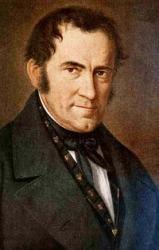1590 - 1635 Person Name: Georg Weissel 1590-1635 Hymnal Number: 845 Author of "Lift up your heads, you mighty gates" in Praise! psalms hymns and songs for Christian worship Weissel, Georg, son of Johann Weissel, judge and afterwards burgomaster at Doranau, near Königsberg, was born at Domnau in 1590. He studied at the University of Königsberg, from 1608 to 1611, and thereafter, for short periods, at Wittenberg, Leipzig, Jena, Strassburg, Basel and Marburg In 1614 he was appointed rector of the school at Friedland near Domnau, but resigned this post after three years, and returned to Königsberg to resume his studies in theology. Finally, in 1623, he became pastor of the newly erected Altrossgart church at Königsberg, where he remained till his death, on August 1, 1635.
Weissel was one of the most important of the earlier hymn-writers of Prussia. His hymns, about 20 in all, are good in style, moderate in length, and varied in metre. The earliest seem to have been written for use at the consecration of the Altrossgart church on the 2nd Sunday in Advent, 1623. The majority are for the greater festivals of the Christian year. The best are No. ii. below, and those for the dying. They appeared mostly in the Königsberg hymn-books, 1639-1650, and in the Preussische Fest-Lieder, pt. i., Elbing, 1642; pt. ii., Königsberg, 1644 [Berlin Library].
Those of Weissel's hymns which have passed into English are:—
i. Im finstern Stall, o W under gross. Christmas. First published in B. Derschau's Ausserlesene geistliche Lieder, Königsberg, 1639, p. 7, in 5 stanzas of 5 lines In the Preussische Fest-Lieder, pt. i., 1642, No. 14, it is entitled "On the Birth of Christ, Lux in tenebris lucet.” The translation in common use is:—
0 miracle of love and might This is a somewhat free translation, omitting stanza v., by Dr. Kennedy, as No. 104 in his Hymnologia Christiana, 1863.
ii. Macht hoch die Thür, das Thor macht weit. Advent. This is a Hymn of Triumph for the Entry of the King of Glory, founded on Ps. xxiv.; and is one of the finest German Advent hymns. First published in the Preussische Fest-Lieder, pt. i., 1642, No. 2, in 5 stanzas of 8 lines, marked as "On the 1st Sunday of Advent."
The translations in common use are:—
1. Lift up your heads, ye mighty gates. This is a good and full translation by Miss Winkworth, in herLyra Germanica, 1st Ser., 1855, p. 10, and her Chorale Book for England, 1863, No. 25. In the Congregational Church Hymnal, 1887, the Evangelical Hymnal, N. Y., 1880, and others, the original form is followed. Other forms are:—
(1) Behold One cometh from afar (i. alt.). This (partly from Mercer) is in the Supplement to the New Congregational Hymn Book, and the 1874 Appendix. to the Leeds Hymn Book.
(2) Behold He cometh from afar. In J. L. Porter's Collection, 1876, altered from No. l.
(3) Oh! hallowed is the land and blest (iii. lines 1, alt.). In the American Sabbath Hymn Book, 1858, &c.
(4) 0 blest the souls, for ever blest (iii. lines1, alt.). In Hymns of the Spirit, Boston, U.S., 1864.
(5) Fling wide the portals of your heart (iv.). In the American Unitarian Hymn Book, 1868.
2. The mighty gates of earth unbar. This is by W. Mercer, based on Miss Winkworth's translation, in his Church Psalm & Hymn Book, 1857, No. 14 (Ox. ed., 1864, No. 71), repeated in Kennedy, 1863. Another translation is: "Lift up, lift up your heads, ye gates," by G. Moultrie, in his Espousals of St. Dorothea, 1870.
iii. Wo ist dein Stachel nun, o Tod? Easter. Founded on 1 Cor. xv., 55-58. First published as No. 3 in pt. ii., 1644, of the Preussische Fest-Lieder, in 5 stanzas of 8 lines, entitled "For the Easter festival." Thence in the Königsberg Gesang-Buch, 1650, p. 193, and others. The form which has passed into English is that in the Hannover Gesang-Buch, 1657, No. 74, in 10 stanzas. This, beginning "O Tod, wo ist dein Stachel nun," is entirely rewritten, probably by Justus Gesenius. Translated as:—
O Death! where is thy cruel sting? This is a full and good version of the 1657 text, as No. 80 in the Ohio Lutheran Hymnal, 1880, marked as a compilation. [Rev. James Mearns, M.A.]
-- Excerpts from John Julian, Dictionary of Hymnology (1907)
Georg Weissel




